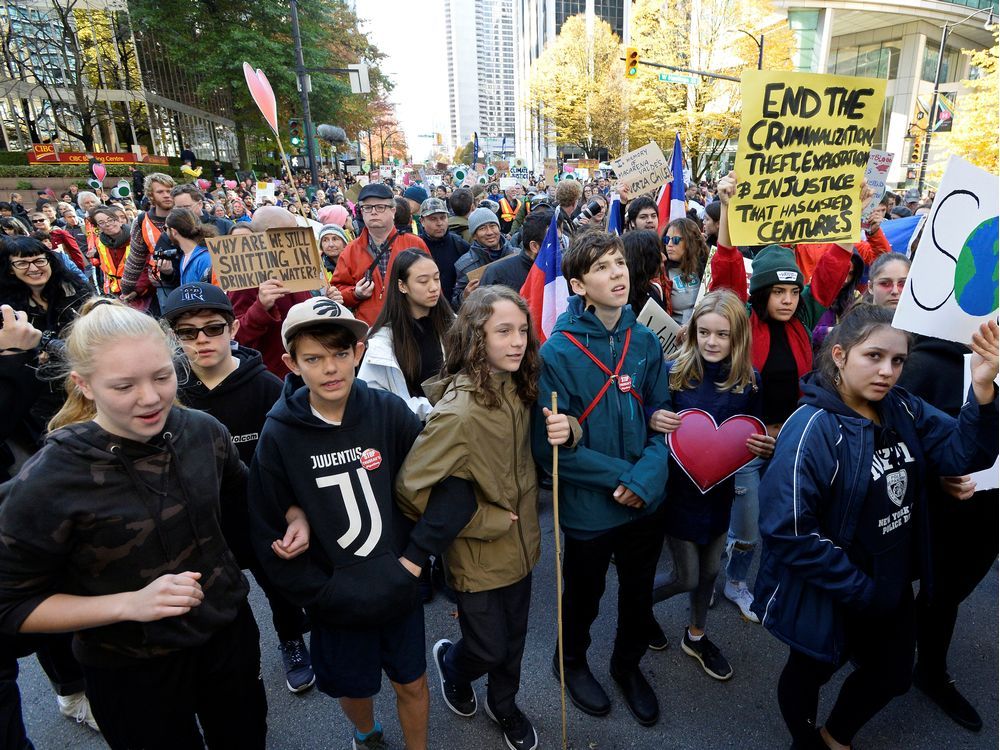Tara Mahoney and Jodi Stark: Resolve to stop arguing about climate change in 2020 — but don’t keep quiet about it

Credit to Author: Hardip Johal| Date: Sat, 28 Dec 2019 02:00:43 +0000
In 2019, climate change catapulted to the top of the list of hot-button issues, next to Trump’s impeachment, the boomers versus millennials feud and the cost of housing. No doubt many people are biting their tongues over the holidays to prevent celebratory dinners from turning into heated debates.
Since the October election, we’ve been talking about Canada as a “country divided” with regard to climate change and our energy future. But are we really that split? When it comes to climate change, people in Canada have been united in their call for bold action. The majority voted for parties (Liberal, NDP, Bloc Québécois and Green) that committed to increasing Canada’s ambition on climate change. Recent polls show that more than 80 per cent of Canadians think climate change is a serious problem and a major threat to their children and grandchildren.
So if most of us care about climate change, why does it feel so divisive? It’s because we have a serious communication problem.
The fossil fuel industry’s long-term, well-financed campaign of disinformation about the causes and impacts of climate change has deeply polluted public discourse. People are drawn to information consistent with their political ideology and social identity, so we selectively expose ourselves to news media and opinions that reflect our motivations and beliefs. As a result, climate change has become a hyper-contentious issue in social settings, like discussing religion or personal finances.
Because we generally want to avoid conflict and the isolation that can follow, we don’t talk about this enormous issue affecting us all. The more we abstain from talking about climate change, the more we feed the spiral of silence.
At the David Suzuki Foundation, we’re working to help people break that silence, because we can’t move forward with climate solutions if we can’t even talk about it without fighting.
Talking about climate change with friends, family, co-workers and neighbours is one of the most effective ways you can make a difference. A Yale Program on Climate Change Communications study found that people’s opinions and willingness to take action on climate change are more influenced by those they know and respect than any other source, including experts.
Who are some of today’s most effective climate communicators? Teenage girls. Research shows teens have been effective at convincing their parents to evolve their thinking on climate change.
But talking about climate change isn’t easy. In a popular TED talk, climate scientist Katherine Hayhoe describes how arguing over facts can feel like a personal attack because people build their identities on them. Confronted with a differing, uncomfortable set of facts, we’d rather dig in than admit we’re wrong. Hayhoe suggests we start by asking questions, listening to others and sharing why climate change matters to us rather than stocking up on facts and arguments.
To break the spiral of silence and decrease polarization, the David Suzuki Foundation developed Canada’s first climate conversation chatbot. Cli-Mate — Your Climate Conversation Coach is a guided practice conversation on Facebook Messenger. Users choose responses from a set of options, and CliMate provides insight on the reaction those responses might elicit. You can choose to practise as someone concerned about climate change speaking to a skeptic or vice versa.
This isn’t about winning — it’s about learning to have productive conversations based on common ground and shared values.
The approach is based on the work of Karin Tamarius of Smart Politics. Drawing on expertise in social and political psychology and extensive experience with online dialogues, she developed a five-step method (ask, listen, agree, reflect, share) to help people have difficult conversations. CliMate models these five steps, so it not only helps you have less-polarized discussions about climate change, it’s useful for any potentially divisive topic.
Instead of biting your tongue and keeping quiet on issues that can divide us, learn from the chatbot to listen, cultivate empathy and build relationships. Conversations about climate change aren’t the problem. They’re part of the solution.
Visit davidsuzuki.org/climateconversations to try CliMate, your climate conversation coach.
Tara Mahoney is a David Suzuki climate change communications fellow. Jodi Stark is a David Suzuki Foundation public engagement specialist.
Letters to the editor should be sent to sunletters@vancouversun.com.
CLICK HERE to report a typo.
Is there more to this story? We’d like to hear from you about this or any other stories you think we should know about. Email vantips@postmedia.com.